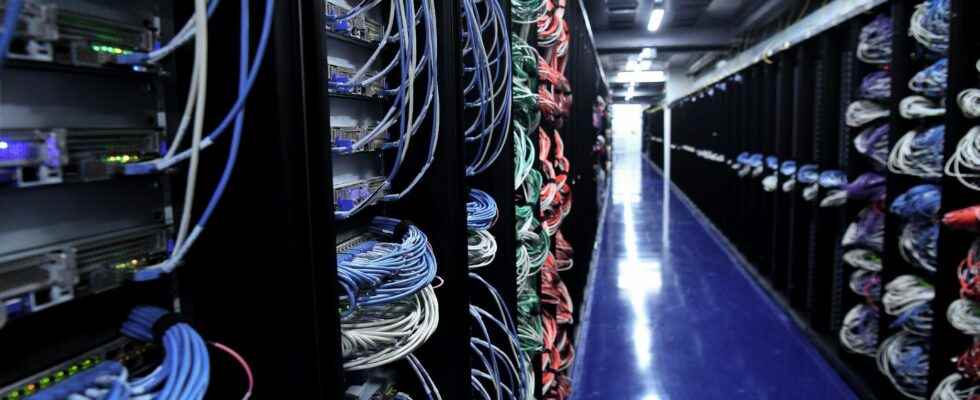If we stick purely to the figures, it would be accommodating to relativize the impact of digital technology on the climate in France. According to a report by Arcep (the telecoms regulator) and Ademe (the ecological transition agency), published in January 2022, digital represents 2% of France’s carbon footprint (manufacturing and use phases included) – and between 3 and 4% of greenhouse gas (GHG) emissions worldwide. That is, for France, much less than the transport sectors (30% of GHG emissions in 2021 according to provisional data from Citepa), industry (19%), buildings (18%) and energy production (10%). But its weight in the national carbon footprint is constantly increasing, up to + 60% in 2040 (6.7%) if nothing is done to limit it, according to the report of a senatorial fact-finding mission.
And this is only part of the impact, that of greenhouse gas (GHG) emissions, commonly highlighted by players in the sector. “However, a very small proportion of them is really competent in terms of assessing environmental impacts. They are very often sincere but ignorant”, regrets Frédéric Bordage, founder of the think tank Green IT. The expert also mentions the consequences – much higher in proportion to GHGs – on the consumption of abiotic resources (non-living, for example “critical” minerals that fill electronic components and whose extraction is polluting), water, and health impacts, including ionizing radiation (energy rays). “As long as we do not look at all the impacts, we will miss the subject and the solutions supposed to reduce them”, he believes. What place, then, should be given to digital technology in the ecological transition at work?
“You shouldn’t ask him for the impossible”
“I hear about digital transition. It is a problem to associate it with ecological transition. This is essential for survival, while the first is for many pushed by industrialists”, slice François Berthoud, engineer at the CNRS and founder of EcoInfo. “Digital is often presented as a solution, or even the only one, but it is only a tool that should remain in its place as a tool”, abounds Frédéric Bordage. “A brilliant tool, which has grown in a certain economic and societal context, from which the impossible should not be asked”, adds Vincent Courboulay, teacher-researcher at La Rochelle University and co-founder of the Institut du Numérique Responsable ( INR).
In an October 2020 report, The Shift Project describes digital as both “a tool and a challenge for the carbon transition”. A challenge because the current growth of the sector is “unsustainable”, being built “around economic models which make profitable the increase in the volumes of content consumed and terminals and infrastructures deployed” – the famous rebound effect. Among its conclusions, the think tank proposes to “go from an instinctive or even compulsive digital to a controlled digital, which knows how to choose its directions”. In short: digital sobriety. Equipping less, better, and questioning “collective technological choices”.
Reserve technologies for certain sectors
“At the rate at which we consume digital, we have it for decades, not centuries”, warns Frédéric Bordage, who points to the current “over-equipment” in France. The consultant advocates a large-scale deployment of the low tech and some slow tech. That is to say “replace pieces of technology with something else. It’s not a decreasing approach, it can be pro-business”, he insists. “It is obvious that we must move towards less expensive, energy-intensive technologies, adds Françoise Berthoud. And reserve those that are expensive to manufacture for sectors where this appears vital.” Health ? Transportation ? Energy? Hence the need for a societal debate on real needs and uses.
“Digital, with algorithms and constraint programming, obviously helps to optimize processes”, to avoid or shift energy consumption shares, explains the founder of Green IT. Let us cite for example the “GTB”, for technical management of the building, generalized at Schneider Electric with its centralized and connected system measuring and activating the heating, air conditioning or lighting of a building according to the uses. Or, more simply, optimal route planning for companies and couriers. “Tomorrow, we may be able to have new ways of coding, calculating, creating architectures, which will lead to even better management of networks and grids”, positive Vincent Courboulay.
“But there is currently an abundance of useless means, counterbalances Frédéric Bordage. When for example we take the TGV, I am not sure that it is very useful to have high-speed Wi-Fi at 300 km / h. ” Vincent Courboulay agrees: “If we continue in our consumption system, we will lose what we will gain.” The three experts regret the general public’s lack of knowledge of digital issues when it has, and this is one more paradox, “an ultra-present side in the sphere of intimacy, but too distant in its negative effects”, observes the teacher-researcher. Political leaders, quick to ask for the nightly disconnection of the Internet box, are beginning to take hold of the subject, but not from the right angle, deplores Françoise Berthoud. “They often think of sobriety in terms of efficiency,” she says.
There is however no doubt, in the eyes of Vincent Courboulay, that this still very recent device – let us remember – that is digital can be part of the ecological transition. But it will necessarily be necessary to “develop hygiene in order, I hope, to make the resources last a little longer. I make the difference between the technology itself, which is neither good nor bad, and the uses made of it by the ‘Man. It’s like science and medicine: medicine and drugs have been derived from it.’ It’s up to us to choose.
